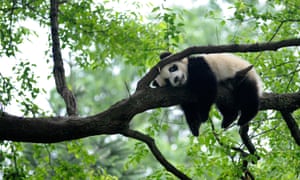
-
5.07pm EDT
17:07
‘Self-regulate fishing around the Galapagos islands’ – Ecuadorian president
-
3.46pm EDT
15:46
‘We must recognise we are not the most important species’ – Costa Rican president
-
2.12pm EDT
14:12
Biodiversity in the UK
-
1.50pm EDT
13:50
Combative Bolsonaro pledges to exploit Brazil’s ‘huge wealth of resources’
-
11.19am EDT
11:19
Increasing protected areas could be ‘biggest land grab in history’ – indigenous activist
-
10.57am EDT
10:57
The Leaders’ Pledge for Nature
-
10.47am EDT
10:47
President Xi Jinping: “We need to respect nature, follow its laws and protect it”
Summary
We are going to close the live blog now. Statements from world leaders have ended, according to our schedule. Thank you for following along. Here is the summary of today’s proceedings in New York at the first-of-its-kind UN summit on biodiversity.
- Brazilian president Jair Bolsonaro attacked “international greed” over the Amazon rainforest in a combative address to the assembly, insisting that countries have the right to use their natural resources. “That’s precisely what we intend to do with the huge wealth of resources in the Brazilian territory,” he said.
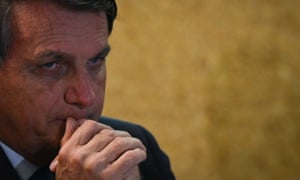
- Contrary to what some had expected before the talks, Chinese president Xi Jinping did not make a second major announcement on the environment at the summit’s opening. Last week, he surprised observers with a pledge to reach carbon neutrality by 2060 and to ensure China’s greenhouse gas emissions peak by 2030.
- More than 70 world leaders and heads of state have now signed the Leaders’ Pledge for Nature, backed by Emmanuel Macron, Angela Merkel, Justin Trudeau, Jacinda Ardern and Boris Johnson. Signatories encouraged others to agree to the 10-point pledge to clamp down on pollution, embrace sustainable economic systems and eliminate the dumping of plastic waste in oceans by the middle of the century as part of “meaningful action”.
- In a thinly veiled message to China, Ecuador’s president Lenin Moreno called on countries to self-regulate their fishing activities in the waters around the Galapagos islands after they were targeted by a vast armada of fishing ships in recent weeks.
- Despite statements from world leaders about the importance of protecting biodiversity, many campaigners were not convinced. Greta Thunberg dismissed “the laughable, cynical empty promises and “pledges” still taking place”. Li Shuo, a Greenpeace climate and energy officer, said statements from world leaders lacked substance.
Greta Thunberg
(@GretaThunberg)“Every few years, governments gather to make solemn promises about the action they will take to defend the living world, then break them before the ink is dry.”
Must read to understand the laughable, cynical empty promises and “pledges” still taking place.https://t.co/fY40fNmKCZ
- Indigenous leaders have warned that plans to protect 30% of the planet by the end of the decade could threaten their people. Youth activist Archana Soreng said it could be the “biggest land grab in history”, while Tuntiak Katan, a prominent Amazon leader, said only through “traditional knowledge can we guarantee the conservation of biodiversity and the reduction in deforestation needed to address climate change”.
Good evening and good night from Patrick Greenfield and Phoebe Weston.
![Coral reef scenery with a Green sea turtle and fusiliersGreen turtle [Chelonia mydas] with a school of Deep-bodied fusiliers (Caesio cuning) in background.](https://i.guim.co.uk/img/media/512745872185facb94c7265e96736af2a2be6e5a/0_105_4288_2573/master/4288.jpg?width=300&quality=85&auto=format&fit=max&s=77780b296c6fb44ffa321bb8b70fb36e)
“We are the parasites,” Spain’s prime minister, Pedro Sanchez, said when describing humanity’s relationship with the planet. “We can go back to a relationship of symbiosis,” he added, saying the delay of the Kunming meeting is an opportunity to scale up ambitions.
Sanchez is focusing on three areas:
- Ensuring 30% of land and sea is protected by 2030
- Restoring 15% of degraded land
- Defending the ‘one health principle’ that recognises the close link between people, plants, animals and their environment
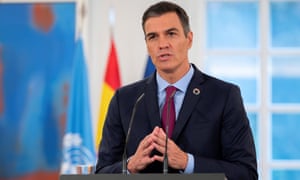
Updated
at 5.45pm EDT
The Irish Taoiseach Micheal Martin tells the summit that the biodiversity crisis is “one of the defining issues of our generation”. A biodiverse planet is essential for humanity, he continues. The global response to restoring nature has to go hand and hand with climate crisis policies, according to the Taoiseach. He says his government will explore an expansion of Ireland’s marine protected areas, adding that his country will use its seat on the UN security council to link human conflict with the environment.
Nepalese prime minister KP Sharma Oli says biodiversity is a “lifeline for us”, helping to sustain human health and prosperity. Living in harmony with nature is part of Nepali culture, he continues. The Himalayan nation has doubled its number of tigers, he tells the summit, adding that his country’s mountain ecosystems help sustain life beyond its borders.
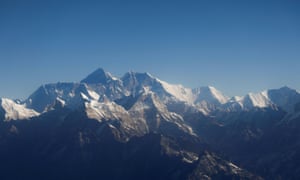
Updated
at 4.24am EDT
Ibrahim Mohamed Solih, president of the Maldives, pledged to designate one island, one reef and one mango grove in each atoll as a protected area. The country is also phasing out single-use plastic by 2023. In reference to the coronavirus pandemic he said humanity is “living with the consequences of our constant disrespect to nature”. He added: “If we continue to disrespect the boundaries of the natural world we will continue to face similar or worse catastrophes.”
The Luxembourg prime minister Xavier Bettel said his country was focusing on three areas of action:
- Strengthening the link between science and policy
- Improving multilateral action to better look after rivers and birds and tackle viruses
- Promoting financial systems that encourage investment in the green economy
He said: “I remain convinced that the strength of men and women has always been their ingenuity … let’s draw on this inexhaustible resource.”
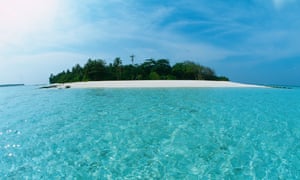
Updated
at 5.29pm EDT
‘Self-regulate fishing around the Galapagos islands’ – Ecuadorian president
Ecuador’s president Lenin Moreno is calling for more financial resources and technological transfers to protect biodiversity as part of the next UN targets. He says his country is one of the most biologically diverse countries on the planet and the protector of the Galapagos islands, “a treasure of Ecuador and the whole world”. In a thinly veiled message to China, Moreno called on countries to self-regulate their fishing activities in the waters around the islands. “We cannot turn our back on nature,” he concludes.
The waters around the Galapagos islands have been targeted by Chinese fishing vessels in recent weeks.
Updated
at 5.15pm EDT
Indigenous people say their right to land is being violated:
Levi Sucre, leader of the AMPB (Alianza Mesoamericana de Pueblos y Bosques – Mesoamerican Alliance of Peoples and Forests) said the economic impacts of the coronavirus means reactive policies have promoted further extraction of natural resources and destruction of forests, leading to the violation of indigenous rights. He said:
We, as indigenous peoples and local communities around the world, have been concerned about the taking of forests, incorrectly called development…. the rights of indigenous peoples and local communities protecting forests is crucial to protect this planet from climate change. We call on the international community to cooperate and turn your eyes to the indigenous peoples. This is not just a matter of our life, it is a matter of your life too, and that of the Planet.
Militza Flaco, youth leader of the AMPB said governments are excluding community leaders from public policy and decision-making. She said:
We, the indigenous peoples, in our silent and sustained struggle for centuries and millennia, continue to live in harmony with nature. We are the example of a living ecological culture. Indigenous peoples fight to protect forests every day. We protect water sources as a resource to survive. We were, are and will be, the guardians of the forest.
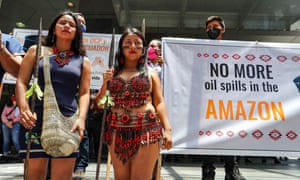
Updated
at 4.25am EDT
“Let me put it plain and simple: without biodiversity there would be no food,” says Qu Dongyu, director general of the UN’s Food and Agriculture Organisation (FAO). The loss of biodiversity undermines efforts to tackle poverty, and to halt biodiversity loss “we need to radically change our economies”, he says.
Q&A What is biodiversity and why does it matter?
Show
Hide
Biodiversity is the variety of life on Earth, in all its forms and all its interactions. “Without biodiversity, there is no future for humanity,” says Prof David Macdonald, at Oxford University. It is comprised of several levels, starting with genes, then individual species, then communities of creatures and finally entire ecosystems, such as forests or coral reefs, where life interplays with the physical environment.
Without plants there would be no oxygen and without bees to pollinate there would be no fruit or nuts. The services provided by ecosystems are estimated to be worth trillions of dollars – double the world’s GDP. Biodiversity loss in Europe alone is estimated to cost the continent about 3% of its GDP, or EUR450m (GBP400m) a year.
The extinction rate of species is now thought to be about 1,000 times higher than before humans dominated the planet, which may be even faster than the losses after a giant meteorite wiped out the dinosaurs 65m years ago. The sixth mass extinction in geological history has already begun, according to some scientists, with billions of individual populations being lost. Researchers call the massive loss of wildlife a “biological annihilation”.
Changes to the climate are reversible, even if that takes centuries or millennia, and conservation efforts can work. But once species become extinct, there is no going back.
Updated
at 4.28pm EDT
Canadian prime minister Justin Trudeau said his country was striving to be a leader in protecting the environment, surpassing its target of protecting 10% of marine areas by 2020. He is pledging to protect 25% of land and oceans by 2025 (an announcement he made in 2019) with 30% protected by 2030.
The Tuvaluan prime minister Kausea Natano wins the prize for the best video background of the evening.
Tuvalu Mission UN
(@Tuvalu_UN)@TuvaluPM Hon. Kausea Natano addresses the #UN #BiodiversitySummit on behalf of the #PacificIslandsForum, committed stewards of the #BluePacificContinent #PIF @ForumSEC ????? pic.twitter.com/zTuoZOBeww
Although, if the world does not act on the climate and biodiversity crises, it won’t be there much longer.
Updated
at 3.57pm EDT
‘We must recognise we are not the most important species’ – Costa Rican president
Costa Rican president Carlos Quesada is the antidote to Jair Bolsonaro. He tells the summit that humanity must focus on three areas to improve our relationship with nature.
First, we must take responsibility and be self-critical by thinking about how our behaviour affects ecosystems. He advocates for economic development models that are based on human wellbeing, not just growth. Second, humility. Quesada says humans must recognise that we are not the most important beings on Earth and be humble enough to learn from nature. Finally, the Costa Rican president says we must focus on equality by protecting ecosystems and decarbonising economies for the good of everyone.
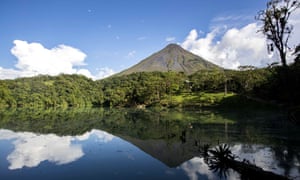
Updated
at 3.50pm EDT
Here is the UN secretary general’s speech from the summit opening.
Antonio Guterres
(@antonioguterres)Humanity is waging war on nature.
We need to rebuild our relationship with the natural world – to avert the worst impacts of the climate crisis and recharge biodiversity for the benefit of people and the planet.#ForNature https://t.co/nO573PQy9K pic.twitter.com/hv1DJXkN8F
Presidents and prime ministers from Kyrgyzstan, Mozambique, Zambia, Costa Rica, Georgia, Estonia and Botswana are up next.
We’ll bring you the highlights of what they say. Costa Rica is a small but mighty country when it comes to UN environment negotiations. President Carlos Quesada has been active behind the scenes generating more financial resources for protecting ecosystems and biodiversity.
Updated
at 3.27pm EDT
The leaders dialogue on addressing biodiversity loss and mainstreaming biodiversity for sustainable development is underway. Statements from Angela Merkel and Imran Khan got us started.
The German chancellor said extinctions are accelerating at a pace never before seen in the history of humanity. She said the world must turn the tide on biodiversity loss by expanding the protection of areas, restoring ecosystems and directing financial resources to protecting plants and animals.
Imran Khan, the prime minister of Pakistan, detailed his country’s 12 climatic zones from the peak of K2, the world’s second highest mountain, to the tropics on the Pakistani coast. He said his government is dedicated to their protection.
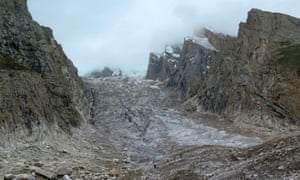
Updated
at 3.24pm EDT
We are going to take a short break now before the next leaders’ dialogue. It will be chaired by Angela Merkel and Imran Khan on addressing biodiversity loss and mainstreaming biodiversity for sustainable development.
That will begin at 3pm in New York and 8pm UK time.
Updated
at 2.53pm EDT
Biodiversity in the UK
Phoebe Weston
Prime minister Boris Johnson’s pledge to protect 30% of land in the UK by 2030 has been cautiously welcomed by conservationists. But they warn that targets need to be legally binding to avoid the creation of “paper parks” that fail to safeguard nature in practice.
Johnson announced at a virtual UN event on Monday that an additional 400,000 hectares of land in England would be protected for nature, with the promise of “ambitious goals and binding targets”.
Johnson joined 64 leaders from around the world to make pledges to tackle catastrophic nature lost ahead of today’s summit. The announcement was very welcome but the government overestimates how much land is effectively protected, said Craig Bennett, chief executive of the Wildlife Trusts. Many of the country’s designated wildlife areas are in poor condition and do not support the wildlife they are meant to provide refuge for.
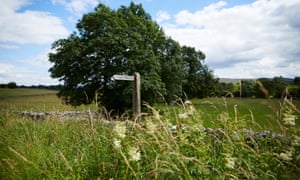
Bennett said:
Our National Parks and areas of outstanding natural beauty (AONBs) are landscape not wildlife designations, and many of these places are severely depleted of wildlife because of overgrazing, poor management or intensive agricultural practices. Our Sites of Special Scientific Interest (SSSIs) are supposed to be protected for nature but even around half of these are in a poor state and suffering wildlife declines.
In England, 26% of land is protected, but an estimated 5% is being well managed for nature. This existing land needs to be much better protected for the prime minster to deliver on this pledge. “Instead of creating more pointless ‘paper parks,’ the prime minister needs to lay out concrete plans and binding legal targets to halt and begin to reverse the decline of nature on land and at sea by 2030,” said John Sauven, executive director of Greenpeace.
The announcement comes after analysis by RSPB found the UK failed to reach 17 out of 20 UN biodiversity targets, because pledges were not matched by action on the ground, resulting in a “lost decade for nature”.
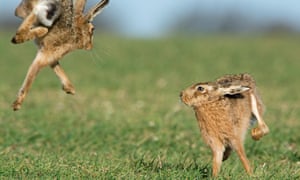
We risk another decade of failure unless biodiversity pledges are put into domestic law like Paris climate agreements, said Martin Harper, director of global conservation at the RSPB. “If then properly backed by a reformed systems of farm payments and new dedicated resources for habitat restoration, which would allow places like our national parks to become an engine for nature’s recovery, we’ll then have a fighting chance to revive our world,” he said.
A 2019 State of Nature report found one in ten UK species is threatened with extinction, with 41% of species in decline. Caroline Lucas, MP for the Green Party, said it was not enough to “talk about protecting nature on the one hand then undermine that action on the other”.
Updated
at 2.20pm EDT